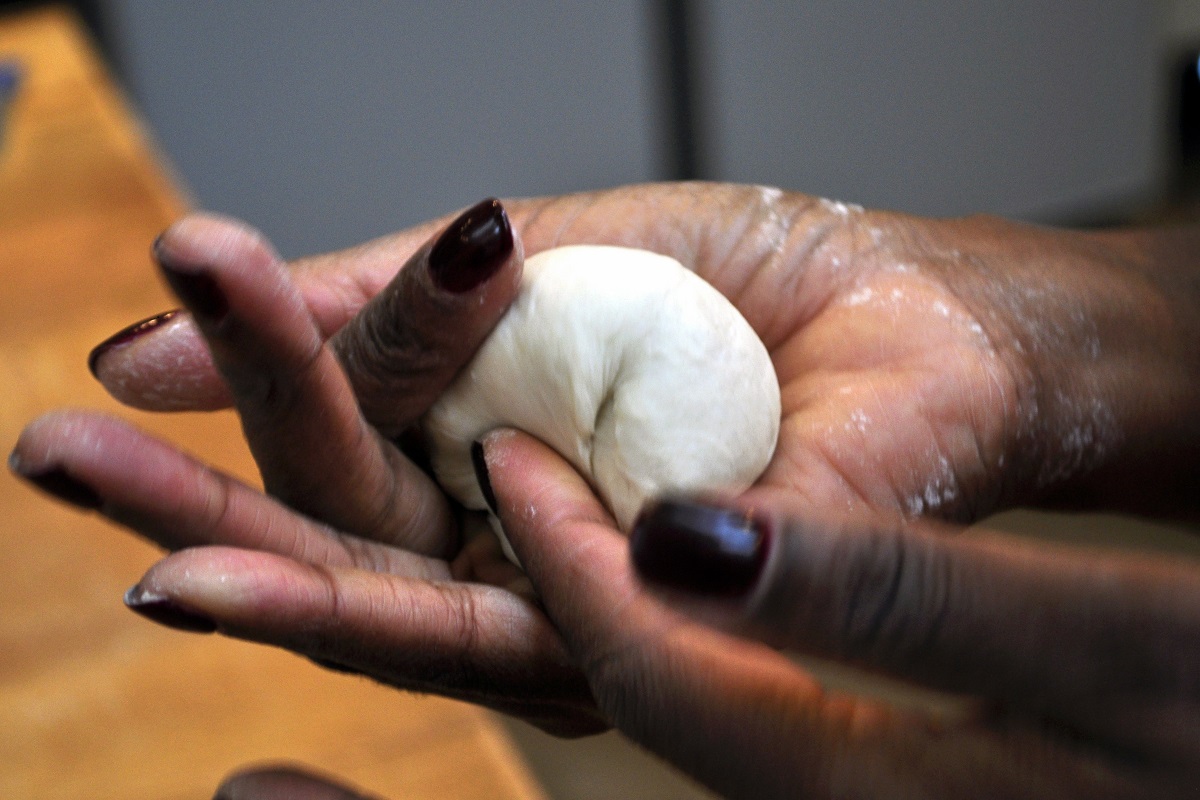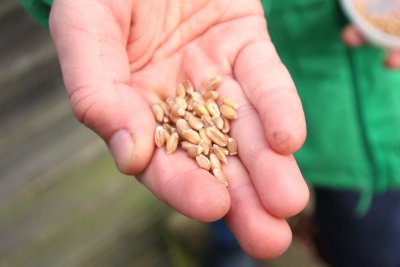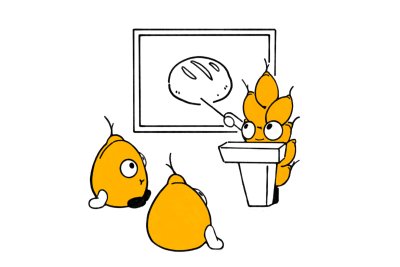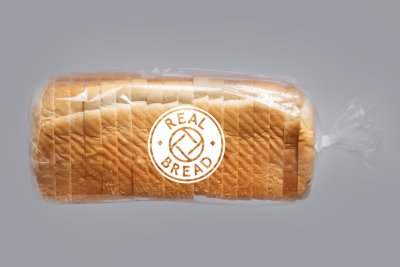Sustain / Real Bread Campaign / Recipes
Breadsticks and chill

Call it mindful baking, therapeutic baking or, well, just baking, many people find that doing the doughy deed gives them a boost. Maybe you are (or will be) one of them…
- Bready benefits
- Top tips
- Bake well start: Preparation
- What to bake
- Method
- Give and gain
- Ways to okay
- Mindful baking
- Learn more
- Big ups for baking
We first published this page in the UK Mental Health Awareness Week 2020 and plan to keep adding to and developing it. If you have relevant tips/advice to share, please email realbread@sustainweb.org
Bready benefits
Making bread offers you something positive on which to focus. Many people find it gives them a sense of purpose and achievement. It may also help you to:
- Relax
- Feel calmer
- Unknot those knotty bits – in mind, body or both
- Take out frustrations on (or gently massage) a lump of dough
- Switch off and escape from whatever else is going on inside or out
...oh and you get to eat it, too!
“It’s not just about baking to eat and feed, it’s the process that is equally powerful and satisfying. It's about nourishing ourselves in both body and mind.” Simon Cobb, Stoneham Bakehouse
While we know making bread can be beneficial and work towards the activity being made available through social prescription, we know it isn’t a cure all. Everyone’s way to okay is different and baking might not be part of yours, but we encourage you to give it a go to find out.
Top tips
Before rolling up your sleeves consider the following. These are even more important if you are keeping them rolled down because you’re unsure about whether or not this baking malarkey is a good idea.
- The only thing you need to prove is dough: You’re not an artisan baker or making bread to win, or even enter, Bake Off, so give yourself a break. People won’t be judging your results and nor should you.
- This is about eating, not art: Your bread might have a crust only a parent could love, but you made it for the pleasure of baking and to stuff in your mouth, not to post on Instagram. It’ll taste great, so read the first tip again.
- Focus on process, not product: It’s good to have an idea of how the bread you’re making should end up, but you're not baking it to sell, so if it turns out differently, roll with it. As the cliché goes: Try to enjoy the journey, rather than just focussing on the destination.
- Dough your own way: One size doesn’t fit all. Rather than one ‘correct’ way to mix, knead, prove, shape, bake or eat bread, bakers use endless combinations of ingredients, recipes and methods that result in a whole world of different breads. Some people follow recipes to the minute, degree and gram, others riff around a theme.
- Go flat out: If things really aren’t heading the direction you’d planned, roll your dough out and make a pizza, or roll it even thinner to cook on a dry frying pan as a flatbread/wrap.
If at any point you're feeling stressed, anxious, or any other negative emotion, just stop and walk away. You can carry on after a while or clear down and do something else.
Bake well start: Preparation
Some things to think about before you begin baking.
Time
Try to give yourself and the dough plenty of time: Neither of you will benefit from being rushed. Real Bread takes time but most of it isn’t your time. A quick recipe that demands you return to the dough after only about 45 minutes of rising, and then again another half hour later, can leave you feeling anxious and unable to leave the house.
By contrast, a long’n’slow method allows you to do five or ten minutes’ here and there, then get on with your life in between. Use these breaks to read, play music, garden, iron, go for a walk, watch telly, do some shopping, have a nap, play sport, cook, meditate or whatever else you do to relax. Find a recipe that will fit in and around your day.
When making bread, watch the dough, not the clock. Almost all recipes include timings but take these as guidelines, rather than rules. If the dough hasn’t risen or baked fully in the time suggested, give it a bit longer.
Ingredients
All you need to make a whole world of breads is flour, water yeast and salt. If you’re making sourdough bread, the yeast comes free with the flour, and some flatbreads don't involve yeast at all. You can either get hold of the ingredients listed in your chosen recipe, or cut your coat according to your cloth and find a recipe to make with the ingredient you have.
Healthy body and mind are inextricably linked, so you might choose to use wholemeal/grain flours and/or bake savoury breads that don’t involve adding sugars and fats.
Equipment
Yes, you can buy all sorts of stuff, but the only kit you really need is a hand or two, plus about four things:
- Scales (ideally digital for accuracy) to measure ingredients
- Bowl and/or or worksurface to mix, work and prove the dough
- Loaf tin, baking tray or banneton/brotform to prove the dough in or on
- Oven or (for flatbread) frying pan / griddle for cooking
A plastic dough scraper is also really useful for dividing dough and for getting the stuff out of, and off, things - including you. From there, it’s up to you in what gear you do and don’t invest.
What to bake
Particularly if you’re making bread to help reduce stress or anxiety, KISS (keep it simple, stupid) applies, and also remember our tips above. There are many free recipes on our website, of which these are amongst the most straightforward:
If working dough is something you want, or need, to avoid, here are some no-knead recipes:
Campaign ambassador, and Bread Angels founder, Jane Mason said: “There is nothing nicer than handing rye dough. It’s fun, funny, slimy, sticky and, ultimately, delicious.”
Julia Ponsonby, author of The Art of Mindful Baking suggested to us that: “The making of your own sourdough starter over a week could also be a nice mindfulness practice. This is something we used to do when we ran one week bread courses at Schumacher College. We use Andrew Whitley's rye starter method - very simple as it only involves flour and water, no yoghurt or raisins!”
Method
Making many types of bread basically boils down to: Mix, prove, shape, prove, bake. How you do each step depends on what type of bread you are making but also personal choice. Even when making the same type, every baker has a slightly (or very) different way of creating it.
To knead or not to knead
How and how much you work your dough, and whether you do it much at all, is partly down to what you're making and partly down to personal choice. Some people love to punch and tug, or slap and stretch their dough like a stress ball. Others prefer rhythmically massaging or working dough like a concertina.
What many people don't realise is that there is no knead to knead. Given enough water and time, the proteins in wheat flour will form gluten networks by themselves. Kneading is simply a mechanical means of banging the molecules together so that more of the bonds form more quickly. If you don't want to (or can't) sign up for the workout, our options include:
- Choosing a no-knead recipe (see above)
- The stretch and fold method (see below)
- Using a food mixer with a dough attachment
Similar to the third of these is using a bread machine. You can simply use it as a mixer or for the whole process, and you'll still enjoy many of the benefits of making your own Real Bread.
Stretch and fold
Choose a long ferment recipe. Scoop the dough out of the bowl with a wetted dough scraper, or your hand, stretch it and fold it in half, then repeat this action. Do this at intervals (eg every hour) through the proving. You can find videos demonstrating how on the internet.
Sticky fingers
While many people are comfortable with, and even love, the feel of dough stuck to their hands, not everyone is. Campaign ambassador Dilly Boase says: “Let dough pull itself together. If it is getting difficult and sticky at any stage of the process, put it back in the bowl, cover it with a lid, plate or bag and leave it for 15 minutes. The dough will become less likely to stick to you and more relaxing to work with.”
She goes on to say that: “Clean hands stick to dough less: Put a scraper/blunt table knife ready when you start mixing. Use this at any point to get all the dough off your hands, rubbing hands with a pinch of flour to get the last off. Repeat as needed.”
Give and gain
If you bake for someone else, the act of giving can add to the basket of bready benefits by providing an extra boost to your feeling of wellness. As Campaign ambassador, and Bread Angels founder, Jane Mason puts it: “When you bake a loaf you may as well bake two.” Not only is it more energy efficient than turning the oven on for just one, you can “give some to a neighbour or suggest a trade so they can give you something in return and everyone feels good.”
Ways to okay
Stoneham Bakehouse founder Simon Cobb says: “Baking has been at the heart of my own journey towards living with my mental health difficulties. The physical process is a therapeutic act in itself, but it's more than that. For me the whole process supports my wellbeing.”
He goes on to note that the New Economic Foundation’s 5 Ways to Wellbeing can all be taken through baking:
- CONNECT: Whether this is connecting with the dough and feeling it on your skin, or connecting with others (face-to-face or remotely) as you bake and then give bread to others. You also connect as you learn with and from other people.
- BE ACTIVE: Kneading can be a full work out sometimes. The dough allows you to really get going and work up a sweat.
- TAKE NOTICE: Noticing the aromas of the ingredients, feeling the changes in the dough’s elasticity, listening to the crackles of the loaf as it comes out of the hot oven; these all allow us to connect with more than it being just a loaf of bread we’re making.
- KEEP LEARNING: We’re all always learning about the process and how we could do things differently. There are so many people out there who are more than willing to offer guidance.
- GIVE: The act of giving something you’ve made to someone else is incredibly powerful and uplifting for the soul. The same goes for sharing your baking skills and knowledge.
Mindful baking
Philip Muskin, a psychiatry professor at Columbia University and the secretary of the American Psychiatry Association, is quoted in The Atlantic as saying: “Baking is mindful. Mindfulness means paying attention to yourself in the moment and not being in the past or the future, but really being there.”
Some people find that they get the most benefit out of making bread when they really concentrate on the details, not just of what and how they are baking, but also what is going on in and around themselves in the moment.
The choice of things on which you can focus while you’re making bread include:
- How the ingredients feel, taste and smell. Their different colours, textures, flavours and aromas.
- If you are making sourdough bread, look at the bubbling starter and think about your billions of co-workers in it that will help you bake.
- Weighing the ingredients, measuring to the exact weight in a recipe.
- The feel of the ingredients in your fingers as you mix them
- The changes in feel and appearance as the dough starts to form and then develops, from shaggy and sticky to smooth and tacky, or even silky
- If you are using wheat, the tension as the gluten develops. Feeling it get elastic and resisting, then relaxing after you have rested the dough, before ‘fighting’ back when you next work it.
- Feeling the tension that builds up in the dough as you shape it.
- Shifting scraps off the bowl or worksurface with your dough scraper, rubbing them off your fingers with a little extra flour.
- The sounds of baking: Ringing mixing bowl, clanking tin or tray, squelching and slapping dough, the fan of the oven, the ‘singing’ of the crust as the baked loaf cools, the crackling as you slice or tear it.
- How your body is part of the process – your breathing, the feel in your muscles and joints.
- The aromas of the baked loaf, the different tastes and textures of the crust and crumb as you enjoy eating it.
- Call it art, science or magic, the alchemy of transforming three or four boring ingredients into Real Bread. The powders and liquid that become a mess then an inert mass, before coming alive as a vital entity, which grows and matures, before you bake it into a delicious and nutritious food to enjoy and prhaps share.
- Everything in between the active steps – maybe birds singing or dogs barking outside, the weather, a radio playing, sitting down for a cuppa, going for a walk – each of which in itself offers you the opportunity of exercises in mindfulness
There are many more. They key thing is to be ‘present’ in the moment, in the now, focussing your thoughts and feelings on making bread, rather than anything from the past, anything that might happen in the future, and anything in the present not directly and immediately connected with what you’re doing.
As you go, you might choose to ask yourself questions, and/or keep a record of your observations, perhaps in the form of notes, a diary, sketches or photos.
Real Bread Campaign ambassador Ian Waterland says: “Making bread is a fundamentally mindful process. It is tactile and incorporates all of the senses. It is productive and satisfying. In short, it can make people feel better.” Ian wrote this article on mindful baking.
More thoughts on mindful baking
“Baking bread literally connects us to the ground; from the soil, through the hands of the farmers and millers to the flour. Metaphorically we need grounding more than ever at a time of fear and uncertainty. Making bread gives ample opportunities for us to be fully present and connected to the physicality of the bread-making process and to have the satisfaction and reassurance of seeing something through from start to golden-crusted finish.” Pauline Beaumont, author of Bread Therapy: The Mindful Art of Making Bread
“The physical act of baking, the way that you knead bread for example, takes your mind out of the intellectual and connects you to your body. For example when you’re baking sourdough, you’re letting things develop at their own pace and you’re observing them. I think not trying to control everything and accepting that things will happen when they’re ready is a useful tool to have in life,” she says. “We’re always afraid of missing out on opportunities, but when we slow down, we often become more successful in life because we gain a heightened sense of awareness.” Julia Ponsonby, author of The Art of Mindful Baking, quoted by HuffPost
“I always try to focus on the aroma of the ingredients as they go in. The smell of malthouse flour as I open the sack is my favourite thing about baking those loaves. It doesn’t need to be every time you put every ingredient in that you stop to take notice, but if there’s one thing it can really help to ground yourself.” Simon Cobb, Stoneham Bakehouse
“Take time to feel the dough change as you knead it, smelling your flour and yeast when you start keeps you focused on your ingredients. Notice how they come together and change through each process to eventually become a beautiful handmade loaf that you can admire with pride.” Mike and Lesley, One Mile Bakery Pontardawe
“Just enjoy the magic of flour, water and salt. Get to know the rhythm of your [sourdough] starter and use it at its peak” Simon & Rachel @upto20words
“Mixing doughs by hand as the sun comes up. Perfect.” Liz Wilson, Ma Baker
Learn more
Through our ongoing Together We Rise initiative, we’re showing how baking can, and does, help to change people’s lives for the better. Other places to find out more include:
- The Art of Mindful Baking, Julia Ponsonby, Leaping Hare Press
- Bread Therapy: The Mindful Art of Baking Bread, Pauline Beaumont, Yellow Kite (17 September 2020)
- Matthew and Suze Townley run classes at One Mile Bakery Hale
- Lesley and Mike run classes at One Mile Bakery Pontardawe
- Ian Waterland runs mindful baking and therapeutic baking classes as Knead Good Bread, and also at The School of Artisan Food.
If you run frequent/regular mindful/therapeutic bread making classes, or have been on one that you’d recommend, please drop a short line to realbread@sustainweb.org
See also
- The Bethlem Baking Buddies report (this includes more therapeutic baking tips)
- The Rising Up report
- Healthy baking in mind (tips for bakery workers)
- Food and mental health
- Growing Health (community food growing for health and wellbeing)
Personal stories written by:
If you would like to share your own experience of how you benefit from making bread, or baking in general, please drop a short line to realbread@sustainweb.org
Big ups for baking
The only way of finding out if bread making is beneficial to you is trying it for yourself, but here are a bunch of comments from baking fans in case any of them help nudge you towards giving it a go.
Find more evidence of the benefits of bread making on our Together We Rise page.
In his foreword to the Real Bread Campaign’s Rising Up report, GBBO 2012 winner John Whaite called baking “A form of pill-less Prozac.” He also told us that “There is something about the meditative process of bread making, that is to say the contemplation of what to do with the dough after the proving processes, that enables me to lift my mood and take control: one of the many powers that I lack when feeling glum.”
In an exclusive interview, GBBO 2019 winner David Atherton told us: "I’ve been making bread since I was smaller than I remember and have always thought it’s really important my mental health. It’s very meditative but maybe the main thing is that you’ve accomplishing something.”
The Guardian quoted Mary Berry as saying: “If you're feeling a little bit down, a little bit of kneading helps.”
“People are afraid to spend money, and they’re feeling like shit. Baking is cheap, it’s easy, and it’s visceral. You’re digging your hands into something pliable, and with an immediate result to it.” Kat Kinsman, author of Hi, Anxiety: Life With a Bad Case of Nerves, quoted in The Atlantic
“Baking is a unique activity that has potential to combine both creative expression and social connection. The act of baking can have an almost meditative effect, allowing people to lose themselves in a creative activity that can positively impact our sense of well-being and connection with those around us.” Psychologist Dr Linda Papadopoulos, quoted by Love Food
“But when it comes to baking, I am always in charge. It takes care, precision and concentration, so I can lose myself in it, and keep the negativity and numbness at bay. Making something beautiful that I’m proud of also helps me get back some of the sense of self-worth that depression eats away at. Baking helped to bring me back; it made me a better mum, wife, daughter and friend.” Laura Jane, quoted by Mind
“I write this now, as someone who has been off any kind of mood enhancers for two years and is out the other side of what felt like a dark and treacherous tunnel. Baking has been the best antidepressant for me. I am now an award-winning businesswoman with everything to live for. If I hadn’t found baking, if I hadn’t found blogging, I honestly don’t know where I would have ended up.” Britt, quoted by the Mental Health Foundation
“I realised that making bread helped me feel a real sense of achievement when I was in the grip of panic – something to still my mind while I got myself together. The repetitive kneading of dough was really soothing, like meditation or mindfulness. It gave me time to just focus on putting my energy into this one thing. Of course, baking didn’t cure my panic attacks – therapy and medication had a huge part to play in that – but it did give me space and a sense of control that helped me process the things I needed to.” Laura Abernethy, writing for The Metro
“This week we almost lost a child to an intentional overdose. He will be okay. This has been a parent's worst nightmare. When I woke up this morning my body and brain were numb. I shuffled into the kitchen made some coffee and then made a loaf of country sourdough bread. Doing so helped me count my blessings.” JoMama, posting on The Fresh Loaf
“I hadn't been baking at home for a while. Then one of my best friends died from an illness he didn't think was as bad as it was. I didn't know what to do with myself. I decided to keep myself busy. The way bread or preparing any food can make you feel is the purest most primal form of creation and therapy in our bodies IMO.” Tom Georgias, posting on The Fresh Loaf
Real Bread Campaign: The Real Bread Campaign finds and shares ways to make bread better for us, better for our communities and better for the planet. Whether your interest is local food, community-focussed small enterprises, honest labelling, therapeutic baking, or simply tasty toast, everyone is invited to become a Campaign supporter.





